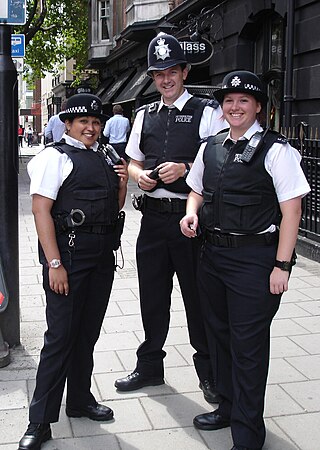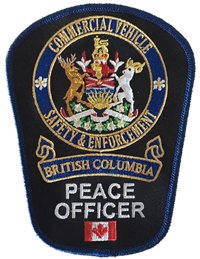
Law enforcement in the United Kingdom is organised separately in each of the legal systems of the United Kingdom: England and Wales, Scotland, and Northern Ireland. Most law enforcement duties are carried out by those who hold the office of police constable of a territorial police force.

The Department for Transport (DfT) is a department of His Majesty's Government responsible for the English transport network and a limited number of transport matters in Scotland, Wales, and Northern Ireland that have not been devolved. The department is run by the Secretary of State for Transport, currently, Mark Harper.

A large goods vehicle (LGV), or heavy goods vehicle (HGV), in the European Union (EU) is any lorry with a gross combination mass (GCM) of over 3,500 kg (7,700 lb). Sub-category N2 is used for vehicles between 3,500 kg and 12,000 kg (26,000 lb) and N3 for all goods vehicles over 12,000 kg as defined in Directive 2001/116/EC. The term medium goods vehicle is used within parts of the UK government to refer to goods vehicles of between 3,500 and 7,500 kg which according to the EU are also "large goods vehicles."

The Driving Standards Agency (DSA) was an executive agency of the UK Department for Transport (DfT).

The MOT test is an annual test of vehicle safety, roadworthiness aspects and exhaust emissions required in the United Kingdom for most vehicles over three years old. In Northern Ireland the equivalent requirement applies after four years. The requirement does not apply to vehicles used only on various small islands with no convenient connection "to a road in any part of Great Britain"; no similar exemption is listed at the beginning of 2014 for Northern Ireland, which has a single inhabited island, Rathlin. The MOT test was first introduced in 1960 as a few basic tests of a vehicle and now covers twenty different parts or systems on or in the vehicle.

A truck driver is a person who earns a living as the driver of a truck, which is commonly defined as a large goods vehicle (LGV) or heavy goods vehicle (HGV).
The Police National Computer (PNC) is a database used by law enforcement organisations across the United Kingdom and other non-law enforcement agencies. Originally developed in the early 1970s, PNC1 went 'live' in 1974, providing UK police forces with online access to the lost/stolen vehicle database. The vehicle owners application quickly followed, giving the police online access to the names/addresses of every vehicle owner in the UK.
The Vehicle Identity Check (VIC) was a regulation concerning car ownership that was in force in the UK between 2003 and 2015.
In the United Kingdom, driving examiners are civil servants employed by the Driver and Vehicle Standards Agency (DVSA) in Great Britain and by the Driver and Vehicle Agency (DVA) in Northern Ireland for the purpose of conducting the practical element of driving tests.

A trading fund is an executive agency, government department or often simply a part of a department, that enables the department to handle its own revenues and expenses separately from overall government finances and more like a business, as opposed to having to obtain funding from the government's legislature and feeding income back into its treasury. A Hong Kong governmental study of trading funds in the UK and Hong Kong describes their nature and purpose as follows:
A trading fund is a financial and accounting framework established by law to enable a government department, or part of a department, to adopt certain accounting and management practices common in the private sector. [The fund] operates on a self-financing basis and does not need to regularly seek funding from the legislature to finance its daily operations after its establishment... the intention [is that such] an institutional change would provide the appropriate flexibility in resource management and nurture a new working culture to improve services in terms of both quality and cost-effectiveness.

National Highways traffic officers, previously Highways Agency traffic officer (HATO), are employed by the National Highways.

The Denby Eco-Link, dubbed the super lorry by the mainstream media, is a commercial vehicle designed and built by Denby Transport of the United Kingdom. The Eco-Link is a 60 tonne fully laden, 25.25m long, 8 axle B-Train type of semi-trailer truck, in which a tractor unit pulls two semi-trailers, using fifth wheel couplings on both trailers. As one prototype of the UK Longer Heavier Vehicle (LHV) vehicle definition, which are longer and heavier than normal Large Goods Vehicles, it is not currently permitted to be used in the UK. As of 2009, the largest ordinary lorries in the UK have 6 axles and a maximum laden weight of 44 tonnes, and can be 16.5m long as single trailer semi-trailer trucks, or 18.75m as drawbar lorries.

Arkansas Highway Police is a state police division of the Arkansas Department of Transportation. The Arkansas Highway Police is responsible for enforcing motor vehicle laws, traffic laws, and commercial vehicle enforcement. It is the second-largest state law enforcement agency in Arkansas after the Arkansas State Police. It was founded in 1929 and is the oldest law enforcement agency in Arkansas.

The Policía Municipal de Madrid is the municipal police force of the city of Madrid.

The Director of Public Transport was the head of the Public Transport Division (PTD) of the Victorian Department of Transport. PTD was the government agency responsible for promoting, providing, coordinating and regulating public transport in the state of Victoria, Australia between August 1999 and June 2013. The Director of Public Transport was created as a statutory office supported by staff of the Department of Transport.
The Director, Transport Safety, who operates as Transport Safety Victoria, is the independent Government agency responsible for bus and marine safety in the State of Victoria, Australia. The position was created as a statutory office by the Transport Integration Act 2010 and the office commenced operation on 1 July 2010. The Rail branch of TSV completed transfer to the Office of the National Rail Safety Regulator (ONRSR) in December 2019.

The Bus Safety Act 2009 is a law enacted by the Parliament of the State of Victoria, Australia and is the prime statute regulating the safety of bus operations in Victoria. The Act was developed as part of the Transport Legislation Review conducted by the Department of Transport between 2004 and 2010 and is aimed at preventing deaths and injuries arising from bus operations in Victoria and establishes a modern "best practice" regulatory framework to assist in maintaining and improving the Victorian bus industry's good safety record.

The Driver and Vehicle Standards Agency (DVSA) is an executive agency of the UK Department for Transport (DfT).

British Columbia Commercial Vehicle Safety & Enforcement is a provincial law enforcement agency that is responsible for the compliance and enforcement of the commercial transport sector, protection of the environment and transportation infrastructure of British Columbia, increasing road safety and protecting the motoring public.
Brigadier Stephen John Tetlow is a chartered engineer and former senior British Army officer.














